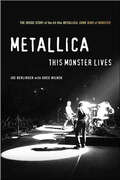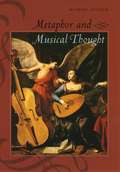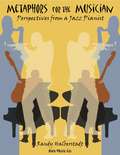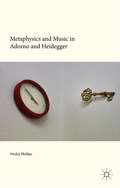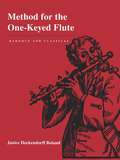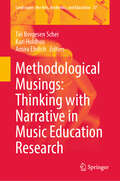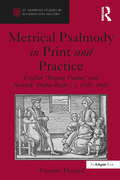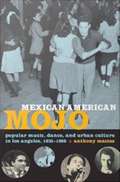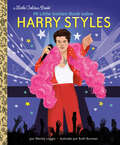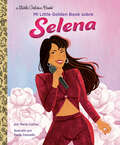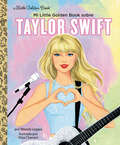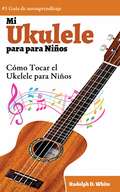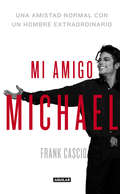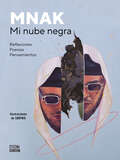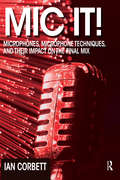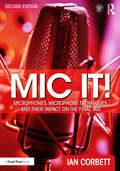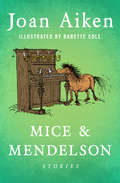- Table View
- List View
Metallica: The Stories Behind the Songs
by Chris InghamA deep dive into the music and songwriting of the world's greatest heavy metal band: Metallica.A must-read for any metalhead, Metallica: The Stories Behind the Songs breaks down the writing and recording of every track from each of the band's studio albums, including classic records such as Master of Puppets (1986) and Metallica ('The Black Album') (1991), right through to 2023's 72 Seasons.Written by former Metal Hammer publisher Chris Ingham and Illustrated with hundreds of stunning photos spanning more than 40 years, this updated entry in the bestselling Stories Behind the Songs series explores the influences behind more than 100 of the band's most celebrated tracks, offering fans a unique perspective into the creation, evolution and performance of their favourite songs.Packed with insight and analysis, this is a revealing guide to Metallica's discography from a true authority on the band, and an essential read for any fan.
Metallica: The Stories Behind the Songs (Stories Behind the Songs)
by Chris InghamA deep dive into the music and songwriting of the world's greatest heavy metal band: Metallica.A must-read for any metalhead, Metallica: The Stories Behind the Songs breaks down the writing and recording of every track from each of the band's studio albums, including classic records such as Master of Puppets (1986) and Metallica ('The Black Album') (1991), right through to 2023's 72 Seasons.Written by former Metal Hammer publisher Chris Ingham and Illustrated with hundreds of stunning photos spanning more than 40 years, this updated entry in the bestselling Stories Behind the Songs series explores the influences behind more than 100 of the band's most celebrated tracks, offering fans a unique perspective into the creation, evolution and performance of their favourite songs.Packed with insight and analysis, this is a revealing guide to Metallica's discography from a true authority on the band, and an essential read for any fan.
Metallica: This Monster Lives
by Greg Milner Joe Berlinger“Triumphs because of the commitment and fearlessness of Metallica . . . [and] shows that tenacious reporting can still produce great narratives.” —New York TimesMetallica is one of the most successful hard-rock bands of all time, having sold more than ninety million albums worldwide. Receiving unfettered access, acclaimed filmmakers Joe Berlinger and Bruce Sinofsky followed Metallica over two and a half years as they faced personal and professional challenges that threatened to destroy the band just as they returned to the studio to record their first album in four years. While the documentary itself provides an insider’s view of Metallica, the two and a half years of production (and more than 1,600 hours of footage) garnered far more than can be expressed in a two-hour film.Berlinger’s book reveals the stories behind the film, capturing the uncertainty, and ultimate triumph of both the filming and Metallica’s bid for survival. It weaves the on-screen stories together with what happened off-screen, offering intimate details of the band’s struggle amidst personnel changes, addiction, and controversy. In part because Berlinger was one of the only witnesses to the intensive group-therapy sessions and numerous band meetings, his account is the most honest and deeply probing book about Metallica—or any rock band—ever written.“A fascinating look at the logistics of making an album and the dysfunctional family that bands can become.” —Chicago Tribune“This book should be required reading for aspiring filmmakers.” —Publishers Weekly“Berlinger takes us even deeper into the inner sanctum. . . . many events that were edited for the film, including a pivotal scene in which drummer Lars Ulrich laces into singer James Hetfield, are transcribed in full.” —USA Today
Metaphor and Musical Thought
by Michael Spitzer"The scholarship of Michael Spitzer's new book is impressive and thorough. The writing is impeccable and the coverage extensive. The book treats the history of the use of metaphor in the field of classical music. It also covers a substantial part of the philosophical literature. The book treats the topic of metaphor in a new and extremely convincing manner."-Lydia Goehr, Columbia University The experience of music is an abstract and elusive one, enough so that we're often forced to describe it using analogies to other forms and sensations: we say that music moves or rises like a physical form; that it contains the imagery of paintings or the grammar of language. In these and countless other ways, our discussions of music take the form of metaphor, attempting to describe music's abstractions by referencing more concrete and familiar experiences. Michael Spitzer's Metaphor and Musical Thought uses this process to create a unique and insightful history of our relationship with music--the first ever book-length study of musical metaphor in any language. Treating issues of language, aesthetics, semiotics, and cognition, Spitzer offers an evaluation, a comprehensive history, and an original theory of the ways our cultural values have informed the metaphors we use to address music. And as he brings these discussions to bear on specific works of music and follows them through current debates on how music's meaning might be considered, what emerges is a clear and engaging guide to both the philosophy of musical thought and the history of musical analysis, from the seventeenth century to the present day. Spitzer writes engagingly for students of philosophy and aesthetics, as well as for music theorists and historians.
Metaphor and Musical Thought
by Michael Spitzer"The scholarship of Michael Spitzer's new book is impressive and thorough. The writing is impeccable and the coverage extensive. The book treats the history of the use of metaphor in the field of classical music. It also covers a substantial part of the philosophical literature. The book treats the topic of metaphor in a new and extremely convincing manner."-Lydia Goehr, Columbia University The experience of music is an abstract and elusive one, enough so that we're often forced to describe it using analogies to other forms and sensations: we say that music moves or rises like a physical form; that it contains the imagery of paintings or the grammar of language. In these and countless other ways, our discussions of music take the form of metaphor, attempting to describe music's abstractions by referencing more concrete and familiar experiences. Michael Spitzer's Metaphor and Musical Thought uses this process to create a unique and insightful history of our relationship with music—the first ever book-length study of musical metaphor in any language. Treating issues of language, aesthetics, semiotics, and cognition, Spitzer offers an evaluation, a comprehensive history, and an original theory of the ways our cultural values have informed the metaphors we use to address music. And as he brings these discussions to bear on specific works of music and follows them through current debates on how music's meaning might be considered, what emerges is a clear and engaging guide to both the philosophy of musical thought and the history of musical analysis, from the seventeenth century to the present day. Spitzer writes engagingly for students of philosophy and aesthetics, as well as for music theorists and historians.
Metaphors for Musicians
by Sher Music Randy HalberstadtThis practical and enlightening book gives insight into almost every aspect of jazz musicianship---scale/chord theory, composing techniques, analyzing tunes, practice strategies, etc. For any level of player, on any instrument. Endorsed by Jessica Wiliams, Jerry Bergonzi, Bill mays, etc.
Metaphors of Depth in German Musical Thought
by Holly WatkinsWhat does it mean to say that music is deeply moving? Or that music's aesthetic value derives from its deep structure? This study traces the widely employed trope of musical depth to its origins in German-language music criticism and analysis. From the Romantic aesthetics of E. T. A. Hoffmann to the modernist theories of Arnold Schoenberg, metaphors of depth attest to the cross-pollination of music with discourses ranging from theology, geology and poetics to psychology, philosophy and economics. The book demonstrates that the persistence of depth metaphors in musicology and music theory today is an outgrowth of their essential role in articulating and transmitting Germanic cultural values. While musical depth metaphors have historically served to communicate German nationalist sentiments, Watkins shows that an appreciation for the broad connotations of those metaphors opens up exciting new avenues for interpretation.
Metaphysics and Music in Adorno and Heidegger
by Wesley PhillipsMetaphysics and Music in Adorno and Heidegger seeks to show how two notoriously opposed German philosophers share a rethinking of the contemporary possibility of metaphysics via notions of music and waiting. Interweaving discourses of philosophy, critical theory, cultural studies and aesthetics, the book puts forward the idea of an expression of waiting in vain as constituting an alternative comportment of promise, in a situation where the promise of metaphysics is questionable. These findings are connected to the broader, historical materialist promise of social change. Throughout the book, the Italian composer Luigi Nono is taken to exemplify the temporal and spatial character of this expression. Metaphysics and Music in Adorno and Heidegger includes new interpretations of both Adorno and Heidegger, and will be of interest to students and scholars of both critical aesthetics and radical thought.
Method for the One-Keyed Flute
by Janice Dockendorff BolandThis indispensable manual for present-day players of the one-keyed flute is the first complete method written in modern times. Janice Dockendorff Boland has compiled a manual that can serve as a self-guiding tutor or as a text for a student working with a teacher. Referencing important eighteenth-century sources while also incorporating modern experience, the book includes nearly 100 pages of music drawn from early treatises along with solo flute literature and instructional text and fingering charts. Boland also addresses topics ranging from the basics of choosing a flute and assembling it to more advanced concepts such as tone color and eighteenth-century articulation patterns.
Methodological Musings: Thinking with Narrative in Music Education Research (Landscapes: the Arts, Aesthetics, and Education #37)
by Kari Holdhus Tiri Bergesen Schei Amira EhrlichThis book focuses on narrative forms of research and inquiry in music education. As narrative approaches gain momentum, questions of methodology become salient. This research anthology highlights a diverse array of narrative methodologies and offers strategies for new researchers. The authors reflect transparently on how they did their narrative analyses, how they position themselves, and which narrative tradition(s) they align with. In this book, editors and authors aim at conceptualizing and clarifying narrative approaches in music education, showing how narrative thinking can be combined with theoretical stances such as discourse analysis and phenomenology. The book demonstrates how awareness of multi-layered dialogical meaning production can inform narrative research. It also addresses performative narratives of musicians and educators. The authors forefront narrative research methods as highly valuable for arts-based research, because of their potential for being expressive and performative, as well as conceptual.
Metrical Psalmody in Print and Practice: English 'Singing Psalms' and Scottish 'Psalm Buiks', c. 1547-1640 (St Andrews Studies in Reformation History)
by Timothy DuguidDuring the Reformation, the Book of Psalms became one of the most well-known books of the Bible. This was particularly true in Britain, where people of all ages, social classes and educational abilities memorized and sang poetic versifications of the psalms. Those written by Thomas Sternhold and John Hopkins became the most popular, and the simple tunes developed and used by English and Scottish churches to accompany these texts were carried by soldiers, sailors and colonists throughout the English-speaking world. Among these tunes were a number that are still used today, including ’Old Hundredth’, ’Martyrs’, and ’French’. This book is the first to consider both English and Scottish metrical psalmody, comparing the two traditions in print and practice. It combines theological literary and musical analysis to reveal new and ground-breaking connections between the psalm texts and their tunes, which it traces in the English and Scottish psalters printed through 1640. Using this new analysis in combination with a more thorough evaluation of extant church records, Duguid contends that Britain developed and maintained two distinct psalm cultures, one in England and the other in Scotland.
Mexican American Mojo: Popular Music, Dance, and Urban Culture in Los Angeles, 1935-1968
by Anthony MacíasStretching from the years during the Second World War when young couples jitterbugged across the dance floor at the Zenda Ballroom, through the early 1950s when honking tenor saxophones could be heard at the Angelus Hall, to the Spanish-language cosmopolitanism of the late 1950s and 1960s, Mexican American Mojo is a lively account of Mexican American urban culture in wartime and postwar Los Angeles as seen through the evolution of dance styles, nightlife, and, above all, popular music. Revealing the links between a vibrant Chicano music culture and postwar social and geographic mobility, Anthony Macas shows how by participating in jazz, the zoot suit phenomenon, car culture, rhythm and blues, rock and roll, and Latin music, Mexican Americans not only rejected second-class citizenship and demeaning stereotypes, but also transformed Los Angeles. Macas conducted numerous interviews for Mexican American Mojo, and the voices of little-known artists and fans fill its pages. In addition, more famous musicians such as Ritchie Valens and Lalo Guerrero are considered anew in relation to their contemporaries and the city. Macas examines language, fashion, and subcultures to trace the history of hip and cool in Los Angeles as well as the Chicano influence on urban culture. He argues that a grass-roots "multicultural urban civility" that challenged the attempted containment of Mexican Americans and African Americans emerged in the neighborhoods, schools, nightclubs, dance halls, and auditoriums of mid-twentieth-century Los Angeles. So take a little trip with Macas, via streetcar or freeway, to a time when Los Angeles had advanced public high school music programs, segregated musicians' union locals, a highbrow municipal Bureau of Music, independent R & B labels, and robust rock and roll and Latin music scenes.
Mexican Ballads, Chicano Poems: History and Influence in Mexican-American Social Poetry
by José E. LimónMexican Ballads, Chicano Poems combines literary theory with the personal engagement of a prominent Chicano scholar. Recalling his experiences as a student in Texas, José Limón examines the politically motivated Chicano poetry of the 60s and 70s. He bases his analyses on Harold Bloom's theories of literary influence but takes Bloom into the socio-political realm. Limón shows how Chicano poetry is nourished by the oral tradition of the Mexican corrido, or master ballad, which was a vital part of artistic and political life along the Mexican-U.S. border from 1890 to 1930. Limón's use of Bloom, as well as of Marxist critics Raymond Williams and Fredric Jameson, brings Chicano literature into the arena of contemporary literary theory. By focusing on an important but little-studied poetic tradition, his book challenges our ideas of the American canon and extends the reach of Hispanists and folklorists as well.
Mi Little Golden Book sobre Harry Styles (Little Golden Book)
by Wendy LoggiaSueña en grande con una biografía Little Golden Book sobre el cantante superestrella, actor e ícono de la moda, Harry Styles. Las biografías de Little Golden Book son la introducción perfecta a la no ficción para lectores jóvenes, ¡así como para fanáticos de todas las edades!Este pequeño Little Golden Book sobre Harry Styles, el artista de fama mundial que comenzó en el concurso de canto The X Factor y como miembro de la banda One Direction, ¡es una historia inspiradora para todos los fans de Harry!Busque más biografías Little Golden Book: • The Beatles • Beyoncé • Lady Gaga • Taylor Swift • Dolly PartonDream big with a Little Golden Book biography about superstar singer, actor, and fashion icon, Harry Styles. Little Golden Book biographies are the perfect introduction to nonfiction for young readers—as well as fans of all ages!This Little Golden Book about Harry Styles—the world famous performer who got his start on the singing competition show The X Factor, and as a member of One Direction—is an inspiring read-aloud for all Harries!Look for more Little Golden Book biographies: • The Beatles • Beyoncé • Lady Gaga • Taylor Swift • Dolly Parton
Mi Little Golden Book sobre Selena (Little Golden Book)
by Maria CorreaAyude a su pequeño a soñar en grande con una biografía Little Golden Book sobre la cantante famosa que ganó el premio Grammy y la reina de la música tejana, Selena. Las biografías de Little Golden Book son la introducción perfecta a la no ficción para lectores jóvenes, ¡así como para fanáticos de todas las edades!Help your little one dream big with a Little Golden Book biography about the Grammy Award winning, Queen of Tejano Music Selena. Little Golden Book biographies are the perfect introduction to nonfiction for young readers—as well as fans of all ages!Este pequeño Little Golden Book sobre Selena Quintanilla, una cantante Americana mexicana que era muy famosa por su impacto en la cultura y la música tejana, es una historia inspiradora para niños pequeños, así como para sus padres y abuelos que la admiran.This Little Golden Book about Selena Quintanilla—the Grammy Award winning Mexican American singer who became known as the beloved icon of Tejano music and culture—is an inspiring read-aloud for young children, as well as their parents and grandparents who are fans.Look for more Little Golden Book biographies:Frida KahloRita MorenoBeyoncéTaylor SwiftLady Gaga
Mi Little Golden Book sobre Taylor Swift (Little Golden Book)
by Wendy LoggiaAyude a su pequeña o pequeño a soñar en grande con esta biografía en español sobre Taylor Swift, la artista multiplatino y ganadora del premio Grammy. Las biografías de Little Golden Book son la introducción perfecta a la no ficción para lectores jóvenes, ¡así como para fanáticos de todas las edades! "Imprescindible para cualquier colección de Taylor Swift". —Rolling Stone¡Este Little Golden Book sobre Taylor Swift, la cantante y compositora cuyo talento distintivo para contar historias la ha convertido en una de las superestrellas más famosas de la música country y pop, es tan inspirador para los niños pequeños como para sus padres Swiftie!Busca biografías Little Golden Book sobre: • Lady Gaga • Beyoncé • Dolly Parton • Elton JohnHelp your little one dream big with a Little Golden Book biography about Taylor Swift, the Grammy Award–winning and multiplatinum artist. Little Golden Book biographies are the perfect introduction to nonfiction for young readers—as well as fans of all ages!"A must-have for any Taylor Swift collection." —Rolling StoneThis Little Golden Book about Taylor Swift--the singer and songwriter whose distinctive talent for storytelling has made her one of the biggest superstars in both country and pop music--is an inspiring read-aloud for young children as well as their Swiftie parents!Look for more Little Golden Book biographies: • Lady Gaga • Beyoncé • Dolly Parton • Elton John
Mi Ukelele para Niños: Cómo Tocar el Ukelele para Niños
by Rudolph D. WhiteEste libro es la perfecta introducción al Ukelele para niños de todas las edades. Sin partituras, los niños pueden seguir fácilmente los claros y simples diagramas y fotos para aprender sus primeros acordes, tocar canciones divertidas y ganar confianza tocando su primer ukelele! •Instrucciones e ilustraciones fáciles de seguir. •Ejercicios simples para seguir y practicar. •Aprenden a su propio ritmo. •Canciones fáciles y divertidas, acordes y ritmos para tocar. •Simplemente sigue las instrucciones en el libro y los niños estarán tocando ukelele en poco tiempo. Compra este libro ahora
Mi amigo Michael: Una amistad normal con un hombre extraordinario
by Cascio, FrankTodo el mundo conoce a Michael Jackson como mito de la música. Ésta es la verdadera historia de su vida sólo como hombre. Para Frank Cascio Michael Jackson ha sido muchas cosas: su segundo padre, su hermano mayor, su jefe, su mentor, su profesor y, por encima de todo esto, su amigo. Cuando lo conoció, Michael Jackson estaba en la cima de su carrera musical. Él era apenas un niño, pero a partir de ese momento Michael Jackson pasó a ser el centro de su vida y así fue durante veinticinco años. Frank ha sido su confidente todo este tiempo. Jamás ha hablado de los incidentes y de los escándalos que salpicaron la vida del artista, nunca ha hecho pública su relación con Michael ni los secretos que le guardaba. Por primera vez desde la muerte del Rey del Pop rompe su silencio para que conozcamos de primera mano toda la verdad sobre Michael Jackson, un hombre eclipsado por su leyenda. En Mi amigo Michael Frank Cascio responde a los rumores, a las mentiras y a las acusaciones que se han vertido sobre Michael Jackson en los últimos tiempos y describe las peculiaridades de su estilo de vida, las polémicas sobre su sexualidad y nos ofrece un retrato minucioso de la complejidad de la personalidad del Rey del Pop, sus pasiones y sus excentricidades. Una mirada amable y sincera sobre un hombre extraordinario, una nueva forma de descubrir al mito. «Conocer a Michael fue una experiencia extraordinaria y normal a la vez. Desde el principio supe que era una persona especial, distinta, un visionario. Era mi amigo, mi familia».Frank Cascio
Mi nube negra: Reflexiones · Poesías · Pensamientos
by MnakMi nube negra, el estreno editorial de MNAK. Freestyle: rap, poesía y sentimiento. Mi nube negra es el primer libro de Ignacio Romero Montero más conocido como MNAK. Una recopilación de poemas, frases, reflexiones y relatos cortos escritos por uno de los mayores talentos del freestyle español. La mejor manera de entender su mundo interior, su historia y cómo Ignacio se convirtió en Mnak.
Mi pasión: Una guía de inspiración by Lola Lolita (Lola Lolita #Volumen 3)
by Lola MorenoMi pasión. Una guía de inspiración by Lola Lolita. Lola Lolita demuestra cada día en sus redes por qué es una inspiración para sus miles de fans. Lola es capaz de transmitir su carisma, su estilo y su pasión en todo lo que comparte con sus seguidores, ya sean bailes, outfits, frases o fotos inspiradoras. En este libro, Lola nos descubre su lado más personal, sus sueños, sus ideas y su visión particular del mundo que nos rodea. Una guía de estilo para descubrir los secretos de esta influencer, y todo aquello que la convierte en un icono generacional. Déjate inspirar por Lola Lolita.
Mi primer amor (Love Army #Volumen 1)
by Elsa M. R.Una historia llena de pasión por la música, por el k-pop, por los amigos, por Seúl y por el primer amor, aquel que marca de por vida. Aerin tiene miedo de empezar un nuevo curso rodeada del vacío que le hacen sus compañeras de clase, hasta que conoce al recién llegado a Seúl, y nuevo en el instituto Yoongi. Ambos compartirán pupitre, su tendencia a gastar bromas y un entusiasmo y entrega por la música sin límites. Y puede que también compartan los mismos sentimientos.
Mi primer amor (Love Army #Volumen 1)
by Elsa M. R.Una historia llena de pasión por la música, por el k-pop, por los amigos, por Seúl y por el primer amor, aquel que marca de por vida. Aerin tiene miedo de empezar un nuevo curso rodeada del vacío que le hacen sus compañeras de clase, hasta que conoce al recién llegado a Seúl, y nuevo en el instituto Yoongi. Ambos compartirán pupitre, su tendencia a gastar bromas y un entusiasmo y entrega por la música sin límites. Y puede que también compartan los mismos sentimientos.
Mic It!: Microphones, Microphone Techniques, And Their Impact On The Final Mix
by Ian CorbettCapture great sound in the first place, and spend less time "fixing it in the mix" with Ian Corbett’s Mic It! Microphones, Microphone Techniques, and Their Impact on the Final Mix. With his expert guidance, you’ll quickly understand essential audio concepts as they relate to microphones and mic techniques, and learn how to apply them to your recording situation. Whether you only ever buy one microphone, are equipping a studio on a budget, or have a vast selection of great mics to use, you’ll learn to better use whatever tools you have. Mic It! gives you the background to design and discover your own solutions to record the best sound possible. The information in these pages will help you record great source tracks that can be easily developed into anything from ultra-clean mixes to huge, organic soundscapes. Beginning with essential audio theory, then discussing the desirable characteristics of good sound and the elements of a good stereo recording, the book covers microphones, mono and stereo mic techniques, the effect of the recording space or room, and large classical and jazz ensemble recording. A variety of mic techniques for vocals and instruments (both individual and groups) are presented, ranging from vital knowledge that no novice should be without, to advanced techniques that more experienced engineers can explore to benefit and vary the sound of their recordings. Corbett explains large room vs. layer-by-layer small-room recording situations, presents the best techniques for each, and shares typical production challenges and their resolutions. The book provides in depth information on how different mic techniques can be used, modified and fine-tuned to capture not only the best sound, but the best sound for the mix, as well as how to approach and set up the recording session, mixing, and avoid common recording and mixing mistakes.
Mic It!: Microphones, Microphone Techniques, and Their Impact on the Final Mix
by Ian CorbettCapture great sound in the first place and spend less time "fixing it in the mix" with Ian Corbett’s Mic It! With this updated and expanded second edition, you’ll quickly understand essential audio concepts as they relate to microphones and mic techniques and learn how to apply them to your recording situation. Mic It! gives you the background to explore, discover, and design your own solutions, enabling you to record great source tracks that can be developed into anything from ultra-clean mixes to massive, organic soundscapes. Beginning with essential audio theory and a discussion of the desirable characteristics of "good sound", Mic It! covers microphones, mono and stereo mic techniques, the effect of the recording space or room, and large classical and jazz ensemble recording. This second edition also features new chapters on immersive audio, immersive recording concepts, drum tuning, and recording techniques for audio for video. Mic It! provides in-depth information on how different mic techniques can be used, modified, and fine-tuned to capture not only the best sound, but the best sound for the mix, as well as how to approach and set up the recording session, prepare for mixing, and avoid common recording and mixing mistakes. • Train your ears with practical audio examples on the companion website. • Develop and test your knowledge as you learn, with concise, applicable exercises and examples that cover the concepts presented. • Record the best sound possible in any situation with Mic It! Corbett’s expert advice ranges from vital knowledge no novice should be without, to advanced techniques that more experienced engineers can explore to benefit and vary the sound of their recordings. Whether you only ever buy one microphone, are equipping a studio on a budget, or have a vast selection of great mics to use, with Mic It! you’ll learn how to make the most of the tools you have.
Mice & Mendelson: Stories
by Joan Aiken Babette ColeThe hilarious adventures of an elderly pony named Mr. Mendelson and his 2 piano-playing field mice friends In a wild, remote place called Midnight Park, there lives an elderly Orkney pony named Mr. Mendelson. He is only 3 feet tall, is black all over, and has a big, handsome head. For years, Mendelson has been ridden by Sam, who is now old enough to go away to boarding school. But before he leaves, Sam asks his grandfather to buy Mendelson a piano. Not for Mendelson, because everyone knows horses can't play the piano, but for Mendelson's friends Gertrude and Bertha--2 talented field mice who were taught to play by a musician who lives in the park. Delighted when the piano is placed under a large oak tree, the mice promise Mendelson a concert at 6 p.m. every night. With 7 enchanting tales, Mice & Mendelson takes readers into the rich world of these farmyard friends. In 1 story, the old pony gets a bad case of the hiccups. In another, he learns to tell time with the help of Gertrude and Bertha, who wind his watch every day. In further adventures, Mendelson saves the moon from drowning in the pond and the village Christmas trees from being stolen. But what Mendelson really wants is to learn how to fly, and surprisingly his wish almost comes true--no thanks to the wicked ways of the scheming gipsy Dan Sligo! This ebook features illustrations by Babette Cole and a personal history of Joan Aiken including rare images from the author's estate.

